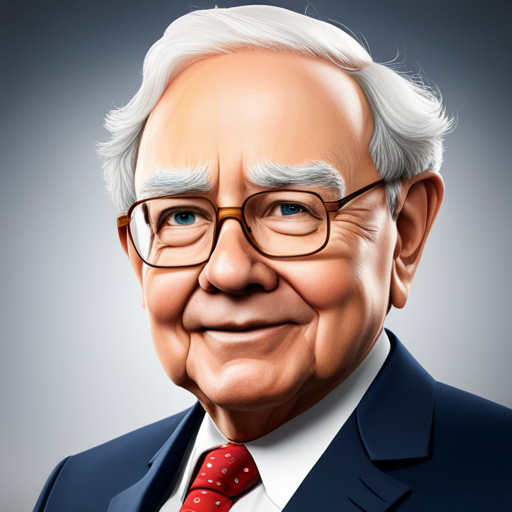Warren Buffett: The Life and Investment Strategies of the Oracle of Omaha

Warren Buffett is one of the most well-known and successful investors in the world. Born in Omaha, Nebraska in 1930, Buffett has amassed a net worth of over $100 billion as of March 2023, making him the fifth-richest person in the world. He is the chairman and CEO of Berkshire Hathaway, a multinational conglomerate holding company that owns a diverse range of businesses, including GEICO, Duracell, and Dairy Queen.
Buffett is often referred to as the “Oracle of Omaha” for his investment prowess and ability to consistently beat the market. He is known for his value investing strategy, which involves buying undervalued stocks and holding them for the long term. Buffett is also a philanthropist, having pledged to give away 99% of his fortune to charity. In 2010, he and Bill Gates launched The Giving Pledge, a campaign to encourage billionaires to give away at least half of their wealth to philanthropic causes.
Despite his immense wealth and success, Buffett is known for his frugal lifestyle and down-to-earth personality. He still lives in the same house he purchased in 1958 for $31,500 and enjoys simple pleasures like playing bridge and eating fast food. Buffett’s investment philosophy and life story have inspired countless people around the world, and he remains a highly respected figure in the business and finance community.
Early Life and Career
Warren Buffett was born on August 30, 1930, in Omaha, Nebraska, to Howard and Leila Buffett. His father was a stockbroker and served as a U.S. congressman. Buffett showed an early interest in business and investing, buying his first stock at the age of 11 and his first real estate investment at age 14.
Education
Buffett attended the University of Nebraska, where he graduated with a degree in business administration in 1950. He then went on to attend Columbia University, where he earned a master’s degree in economics in 1951. While at Columbia, Buffett studied under Benjamin Graham, who would become his mentor and influence his investment philosophy.
Investing Beginnings
After completing his education, Buffett worked briefly for his father’s brokerage firm before moving to New York City to work for Graham’s investment firm. Graham’s value investing philosophy, which emphasized buying stocks that were undervalued by the market, had a significant impact on Buffett’s investment approach.
In 1956, Buffett returned to Omaha and started his own investment partnership, Buffett Partnership Ltd. Over the next decade, the partnership achieved remarkable success, with an average annual return of 29.5%. In 1965, Buffett dissolved the partnership and used the proceeds to acquire a controlling interest in a textile manufacturing firm called Berkshire Hathaway.
Buffett’s early career was marked by a focus on value investing and a willingness to take a long-term view of his investments. He believed in investing in companies with strong fundamentals and a competitive advantage, rather than trying to predict short-term market movements. This approach has been a key factor in his success as an investor.
Berkshire Hathaway
Berkshire Hathaway is a multinational conglomerate holding company that was founded by Warren Buffett in 1839. The company is headquartered in Omaha, Nebraska, and is known for its diverse portfolio of investments and subsidiaries. Berkshire Hathaway is often referred to as one of the most successful investment companies in the world, and Warren Buffett is often referred to as the Oracle of Omaha.
Acquisitions
One of the key features of Berkshire Hathaway’s success is its acquisition strategy. Over the years, the company has acquired many well-known brands, including Coca-Cola, Duracell, Geico, and Dairy Queen. The company’s acquisition strategy is focused on acquiring companies that have strong brands, loyal customers, and a solid financial track record.
Investment Philosophy
Berkshire Hathaway is known for its unique investment philosophy, which is focused on long-term value investing. The company invests in companies that have a strong competitive advantage and a proven track record of success. Berkshire Hathaway’s investment philosophy is also focused on investing in companies that have a strong management team and a solid financial track record.
Stock Performance
Berkshire Hathaway’s stock performance has been impressive over the years. The company’s stock has consistently outperformed the market, and its shareholders have seen significant returns on their investments. Berkshire Hathaway’s stock price is often used as a benchmark for the overall performance of the stock market.
In 2020, Berkshire Hathaway faced some challenges due to the pandemic and the economic downturn. The company’s stock price declined, and it faced some criticism from shareholders and U.S. Congress members for not making any major acquisitions during the pandemic. However, the company’s stock price has since rebounded, and it continues to be one of the most successful investment companies in the world.
Shareholder Meeting
Berkshire Hathaway’s annual shareholder meeting is one of the most highly anticipated events in the investment world. The meeting is attended by thousands of shareholders and features a Q&A session with Warren Buffett and Charlie Munger. The meeting is known for its lively discussions and debates about the company’s investments and strategy.
Philanthropy
Warren Buffett and Berkshire Hathaway are also known for their philanthropic efforts. Buffett has pledged to give away the majority of his net worth to charity through The Giving Pledge, and he has also donated billions of dollars to the Gates Foundation. Berkshire Hathaway also supports many charitable organizations and causes through its subsidiaries and investments.
In conclusion, Berkshire Hathaway is a successful investment company that has a unique investment philosophy and a diverse portfolio of investments and subsidiaries. The company’s acquisition strategy, investment philosophy, and stock performance have made it one of the most successful investment companies in the world.
Philanthropy
Warren Buffett is known not only for his successful investment strategies but also for his philanthropic efforts. He has pledged to give away 99% of his wealth to charitable causes, making him one of the most generous philanthropists in the world. This section will explore his philanthropy efforts, including The Giving Pledge, his donations, and the causes he supports.
The Giving Pledge
In 2010, Warren Buffett, along with Bill and Melinda Gates, launched The Giving Pledge, an initiative that encourages billionaires to give away the majority of their wealth to philanthropic causes. As of 2023, over 200 individuals and families from around the world have joined the pledge, committing to donate at least half of their wealth to charitable causes.
Buffett’s commitment to The Giving Pledge is evident in his own philanthropic efforts. He has donated billions of dollars to various charitable causes, including the Gates Foundation and his own family foundations.
Donations
Warren Buffett’s philanthropic donations have been significant, with the majority of his giving going towards education and health-related causes. In 2006, he pledged to donate 83% of his wealth to the Gates Foundation, which at the time was worth approximately $31 billion. Since then, he has continued to donate to the foundation, as well as his own family foundations, which focus on education, poverty alleviation, and social justice.
Buffett’s donations have also gone towards disaster relief efforts, such as Hurricane Katrina and the 2010 earthquake in Haiti. He has also donated to organizations that support research into cancer and other illnesses.
Causes
Warren Buffett’s philanthropic efforts have focused on a variety of causes, including education, poverty alleviation, and healthcare. He has donated to numerous educational institutions, including the University of Nebraska-Lincoln, where he received his undergraduate degree. He has also supported organizations that provide educational opportunities to underprivileged children.
In addition to education, Buffett’s philanthropy has focused on poverty alleviation. He has donated to organizations that provide housing and other basic needs to those in need. He has also supported efforts to address income inequality, such as the Earned Income Tax Credit.
Finally, Buffett has donated to healthcare-related causes, particularly those focused on research into cancer and other illnesses. He has also supported efforts to improve access to healthcare for underserved populations.
In conclusion, Warren Buffett’s philanthropic efforts have been significant and have had a positive impact on numerous causes around the world. Through The Giving Pledge and his own charitable donations, he has set an example for others to follow and has made a lasting impact on the world of philanthropy.
Personal Life
Warren Buffett is known for his frugal lifestyle and philanthropy, but he also has a rich personal life. This section will explore his family and hobbies.
Family
Warren Buffett married Susan Thompson in 1952, and they had three children together. Sadly, Susan passed away in 2004. In 2006, Buffett married his longtime companion, Astrid Menks, at his daughter’s home in Omaha. The wedding was a low-key affair, attended by only a few close friends and family members.
Buffett’s children have all pursued their own careers, with Howard serving as the chairman of the board of Berkshire Hathaway, and Peter and Susan working in the philanthropic sector.
Hobbies
Buffett has a number of hobbies that he enjoys in his free time. One of his favorites is playing bridge, which he has described as a “great intellectual challenge.” He has also been known to play online bridge with fans from around the world.
Buffett is also a fan of pinball machines, and has collected a number of vintage machines over the years. He even has a pinball machine in his office at Berkshire Hathaway.
In addition to bridge and pinball, Buffett is an avid reader and has been known to spend several hours a day reading newspapers and books. He also enjoys spending time with his family and friends, and has said that his favorite activity is simply “having dinner with people I love.”
Despite his immense wealth and success, Warren Buffett remains grounded and focused on the things that matter most to him – his family, his hobbies, and his philanthropy.
Investing Advice and Legacy
Warren Buffett is widely regarded as one of the most successful investors of all time. He has amassed a fortune through his investment philosophy, which emphasizes long-term value investing and a focus on companies with strong fundamentals and competitive advantages. In this section, we will explore some of Buffett’s investing principles and examine the legacy he has created through his successful investments.
Investing Principles
Buffett’s investment philosophy is based on the teachings of his mentor, Benjamin Graham, who emphasized the importance of value investing. Graham believed that investors should focus on buying stocks that are trading at a discount to their intrinsic value, and that this approach would lead to long-term capital gains. Buffett has taken this philosophy a step further, focusing on companies with strong fundamentals and competitive advantages, which he believes will provide a margin of safety for his investments.
One of the key principles of Buffett’s investing philosophy is the importance of owning companies for the long term. He has famously said that his favorite holding period is “forever,” and he has held many of his investments for decades. This approach has allowed him to benefit from the power of compounding, which has helped him to generate enormous wealth over the course of his career.
Successful Investors
Buffett’s success as an investor has made him a role model for many aspiring investors. He has shared his wisdom and advice with others, and many successful investors have followed in his footsteps. One of the most notable examples is Charlie Munger, who has been Buffett’s business partner for many years. Munger has credited Buffett with teaching him many valuable lessons about investing and business, and he has become a successful investor in his own right.
Other successful investors who have been influenced by Buffett’s philosophy include Bill Ackman, Seth Klarman, and Joel Greenblatt. These investors have all achieved impressive returns by following Buffett’s principles of value investing and long-term ownership.
In conclusion, Warren Buffett’s investing advice and legacy have had a profound impact on the world of investing. His principles of value investing and long-term ownership have helped him to achieve enormous success, and have inspired many others to follow in his footsteps. By focusing on companies with strong fundamentals and competitive advantages, Buffett has created a legacy that will endure for many years to come.
Controversies and Criticisms
Warren Buffett, despite being one of the most successful investors of all time, has faced his fair share of controversies and criticisms throughout his career. This section will explore some of the most notable controversies and criticisms that have been leveled against him.
Mismanagement
One of the most significant criticisms of Warren Buffett is that he has mismanaged some of the companies he has acquired through Berkshire Hathaway. For example, in 2017, Berkshire Hathaway acquired the truck stop chain Pilot Flying J, which was later embroiled in a fuel rebate scandal that resulted in the company paying a $92 million settlement. Similarly, in 2016, Berkshire Hathaway faced criticism for its handling of Clayton Homes, a mobile home manufacturer that was accused of predatory lending practices.
Political Views
Warren Buffett’s political views have also come under scrutiny. While he is generally seen as a supporter of progressive policies, he has faced criticism from both the left and the right. Some on the left have criticized him for not doing enough to support progressive causes, while some on the right have accused him of being a hypocrite for advocating for higher taxes while using tax loopholes to minimize his own tax burden.
Taxes
Warren Buffett’s tax practices have also been a subject of controversy. In 2011, he famously wrote an op-ed in The New York Times in which he argued that the wealthy should pay higher taxes. However, it was later revealed that he had paid a lower tax rate than his secretary in some years. This has led to accusations of hypocrisy and has fueled debates about tax policy.
Forbes
Warren Buffett’s net worth has also been a subject of controversy. While he is consistently ranked as one of the richest people in the world by Forbes, some have questioned the accuracy of these rankings. In particular, it has been suggested that Forbes may overestimate the value of Berkshire Hathaway’s holdings, leading to an inflated net worth for Buffett.
Silicon Valley Bank
In 2003, Warren Buffett faced criticism for his role in the collapse of Silicon Valley Bank. Berkshire Hathaway owned a significant stake in the bank, which was later found to have engaged in fraudulent accounting practices. While Buffett was not accused of any wrongdoing himself, some argued that he should have been more vigilant in his oversight of the bank.
Federal Deposit Insurance Corporation
In 1991, Warren Buffett faced criticism for his involvement in the failure of the Federal Deposit Insurance Corporation (FDIC). Berkshire Hathaway had acquired a failing savings and loan institution, which was later taken over by the FDIC. While Buffett was not accused of any wrongdoing, some argued that his involvement in the deal had contributed to the failure of the bank.
Overall, while Warren Buffett’s investment philosophy has been widely praised, he has faced criticism and controversy throughout his career. From accusations of mismanagement to controversies surrounding his political views and tax practices, Buffett’s reputation has not been without its blemishes.












